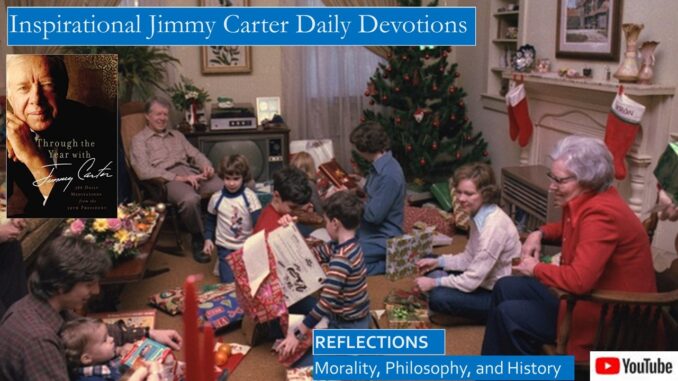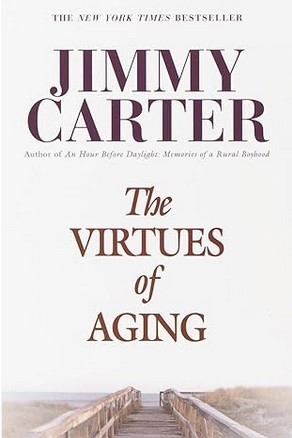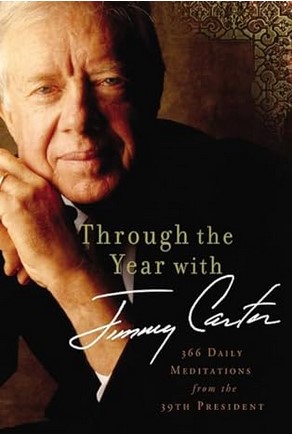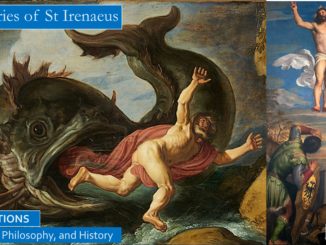
What can we learn by reflecting on the inspirational daily devotions of Jimmy Carter?
What can we learn from his devotionals that reflect on past and current history?
What can we learn from the many Old Testament stories about the patriarchs, and the New Testament parables?
YouTube Script with Book Links:
https://www.slideshare.net/BruceStrom1/jimmy-carter-presidency-then-carter-center-diplomacy-global-health-and-charity
YouTube video for this blog: https://youtu.be/sN3MQevsDa4
DAILY DEVOTIONS OF JIMMY CARTER
Day 199. In a speech, “I once told a joke about a church-going man who died. When he got to the pearly gates, St. Peter said, “I’m glad you taught Sunday school for years, but what have you ever done for poor people?”
The man replied, “Back in the depression my neighbor’s house burned down. I had a table on my back porch we didn’t need so I gave it to him without any charge, I think.”
Peter asked, “But how much was it worth?”
The man answered, “About fifty cents.”
St Peter nodded and said, “Any other times?”
The man answered, “Yes, once a homeless family came by asking for food. I gave them two sandwiches and a glass of tea each.”
St Peter said, “That’s very nice. How would you value that?”
The man replied, “Oh, that was at least fifty cents.”
“So, St Peter turned to an angel and said, “Go down to earth and see if what he claims is true.”
So, the angel went down and back and said, “Yes he really did those things.”
St Peter asked, “What do you think we should do with him?”
The angel answered, “Give him his dollar back and tell him to go to hell.”



Day 1. “Some of the richest people in America who makes several $1,000,000 a year acting in movies or recording songs or playing sports often wind up in jail or on Skid Row after becoming addicted to drugs or alcohol. Some lose their families or reputation because of misconduct. This should be very sobering to us. We tend to think that money and fame and the adulation of others will make us happy, but we come to realize that those things are not foundations for real success. Material things can always let us down, especially the things that make lavish promises, but God never will.”
Day 145. Although Jimmy Carter disagrees with the Hundred List by Michael Hart, he admits there is a lesson to be learned. In his book, Hart “lists the hundred people with the greatest impact on human history. The first person on his list is Muhammad,” and in third place is “Jesus Christ. The author explains that Mohamed appears on the list above Jesus because Mohamed not only founded the Islamic faith, but wrote its central religious text, the Koran, and was the political and military leader who spread his teaching to so many nations. Christ, on the other hand, didn’t write any scripture, and according to Hart, Jesus shares the credit for the spread of Christianity with others including Paul, who is number six on the list. Also, Jesus was not a political or military leader during his time on earth.
Heart says, however, that the teachings of Christ are the most transforming, interesting, and revolutionary words in history. As an example, he cites Christ’s command to love our enemies and to forgive those who sin against us. He concludes that if Christians actually practiced Christ’s teachings Jesus, would have topped his list.”
Day 29. “The Greeks couldn’t imagine a God who would be who could be punished much less one susceptible to human execution. The Jews couldn’t accept a Messiah who didn’t expel the Romans and establish a Jewish theocratic nation, much less someone hung upon a tree!
It is through Christ’s humiliation on the cross, however, that we can be reconciled to God. Christ cannot accept sin; it must be punished. Christ, in his perfection, was sacrificed for those who believe in him. That is the significance and transforming nature of the cross.”
JIMMY CARTER REFLECTS ON HISTORICAL EVENTS
Day 331. “One day, Saint Francis visited a little dilapidated church. When praying, he received a message from God to repair the church. Francis thought that this meant to repair this particular building, so he took part of the money that he had received from begging, and he and his friends repaired that little church building. When they finished, it occurred to Francis that God might be calling him to something larger.”
Shortly thereafter, Francis and his friends visited Rome, and got an audience with the Pope. In the year 1209, Pope innocent III unofficially endorsed Francis’ simple rule for serving the poor, and in 1223 Pope Honorius III officially declared the order of Saint Francis.”
An alternate interpretation of his life is that St Francis really was really called to spend the first year or two of his ministry repairing churches to prepare him to later repair the church at large. Often in life you have to start out small before you can achieve great accomplishments.
Day 92. “During the brutal Nazi regime of Adolf Hitler, a German pastor named Dietrich Bonhoeffer became a martyr for Christ. He had led several churches” in several countries, “but regardless of where he served his Lord, his heart always remained in Germany.
Bonhoeffer had a friend named Reinhold Niebuhr, a German theologian living in the United States.” He invited Bonhoeffer to lecture in America. “During that time, Hitler rose to power and began to persecute his dissenters, including some in the church. Niebuhr tried to induce Bonhoeffer to stay in the United States, where he would remain safe, but Bonhoeffer refused. ‘I have to be among other Christians who are being persecuted in Germany,’ he declared.
So Bonhoeffer returned to his beloved homeland, and once there he preached against Nazism, racism, and white supremacy. Predictably, Hitler had him arrested.” “Just a few days before the Allies liberated Germany, Hitler ordered his execution.
One of Bonhoeffer’s most famous books carried the title, The Cost of Discipleship. In it he condemns what he calls cheap grace. He insists one cannot follow Christ without full commitment, wherever that commitment might lead. In his case it led to a Nazi gallows.”
Dietrich Bonhoeffer and Karl Barth were leaders in the Confessing Church that resisted the Nazi infiltration and cooption of German Christianity, opposing the Nazi notion that Jesus wasn’t Jewish and that Christianity should condone the persecution of the Jews.
Christians Surviving Fascism in World War II: Under Hitler’s Brutal Nazi Regime, Were Brave Protests Ever Successful?
https://seekingvirtueandwisdom.com/christians-surviving-fascism-in-world-war-ii-under-hitlers-brutal-nazi-regime-were-brave-protests-ever-successful/
https://youtu.be/QP9UR8fqfvs
Day 277. “For a long time, I thought our top elected officials were telling the truth about the Vietnamese War. Only when I became governor did I begin to see that the American people were being misled. My oldest son, Jack, considered the draft unfair, because anybody who could afford college could avoid conscription. On principle, he quit school and went to serve in Vietnam. In the middle of the conflict, people had to decide where their loyalties lie.”
In the Bible, “God told Jeremiah to command Israel’s leader to accept the sovereignty of Babylon, news that few wanted to hear. For faithfully delivering God’s message, Jeremiah was considered a coward, a traitor, and a false prophet by many Israelites.
This is not unlike what happened to Martin Luther King when he condemned racial segregation. He was arrested and imprisoned, and many white people in the South considered him a communist and a traitor. Yet, despite overwhelming opposition, Dr King remained true to his convictions and continued to act on his beliefs.”
Day 62. “A group of liberal academics calling themselves the Jesus seminar meets annually to discuss the search for the Historical Jesus. Their stated purpose is to discover the real Jesus, but apparently, these scholars consider any biblical statement about Jesus false if they can’t prove it through their own iconoclastic methods. These scholars have voted that only one sentence in Mark’s entire gospel, and just a few phrases in the Sermon on the Mount are authentic, and they urge us to disregard completely the Gospel of John.”
Day 311. “My favorite theologian is Reinhold Niebuhr. When I first became involved in politics, I read his book Moral Man and Immoral Society: A Study of Ethics and Politics. It describes how to conduct oneself in public affairs, How do you apply Christian principles when engaging in a competitive political campaign, when confronting political adversaries or when working in some legislative body?
The purpose of politics, Niebuhr says, is to establish justice in a sinful world. Justice means guaranteeing human rights and treating everyone fairly. According to Niebuhr, this is the highest possible goal for a political leader.
Yet Niebuhr insists that this high goal is not nearly so exalted as the Christian’s central calling to love one another, especially with agape love. This is self-sacrificial love for someone who may not deserve to be loved, who refuses to love you back, love that brings no recognition for your efforts. This is the kind of love that Christ personified.”
BIBLE STORIES IN DEVOTIONS
Day 98. “One day, out of the blue, God said to Abraham, ‘Offer me a sacrifice.’
Abraham replied, ‘I’ll do anything you ask.’
God said, ‘Take Isaac and your sacrificial knife, and go to this remote place, and there sacrifice your son.’
The command must have stunned Abraham, but he obeyed, although in great sorrow. When father and son reached the appointed place, Isaac looked around, and asked, ‘Where’s the goat?’
Abraham said that God would provide the sacrifice. and then proceeded to tie up his son. The last moment, however, as Abraham raised his dagger to plunge it into Isaac’s heart, an angel stopped him, and showed him a ram with its horns entwined in vines.
‘You have proven your faith,’ said the angel. ‘Sacrifice the ram instead.’”
JOSEPH IS RECONCILED TO HIS BROTHERS
In the Bible, Joseph and Benjamin were the sons of Jacob and his favored wife, Rachel, while the other ten sons were sons of his less favored wife, Leah. Joseph was sold into slavery by his jealous brothers but rose to prominence after he became known as an expert in interpreting the dreams of Pharaoh, warning him to store grain for the upcoming years of famine.
When his brothers came to Egypt to buy grain, they did not recognize Joseph, who had the dress and spoke the language of the Egyptians. After talking to his brothers, he said they must bring Benjamin with them on their next return trip if they wanted more grain.
Day 243. HISTORY In the story of Joseph and Benjamin, “a dramatic confrontation occurred between Judah and his father. Judah told Jacob that if Benjamin returned to Egypt with them to get more grain that he, Judah, would be Benjamin’s surety. “’If I fail to bring Benjamin back,’ he said, ‘in effect my life is forfeit.’ He put up his life and his very soul as a warranty that he would not lose Benjamin.
There was no selfishness in what Judah proposed. He was totally concerned about his brother Benjamin and the health of his father, Jacob. That’s why, in an emotional speech, he told Joseph that will be a slave for the rest of his life in Benjamin’s place, if you will just let him go home to our father Jacob. Joseph felt so overwhelmed by Judah’s selflessness that he wept on Benjamin’s neck and the brothers were reconciled.”
Day 256. “In Joseph’s dream, eleven stars, representing his brothers, and the moon, his father Jacob himself, all bowed down to the single star who was Joseph. He told his family about this dream, irritating even his father and mother. Joseph’s brothers eventually got so fed up with his pride and arrogance that one day they decided to kill him and sell him into slavery.
This story holds a crucial lesson for all of us. Just because we have knowledge of something, even something as true as Joseph’s dreams, doesn’t mean we should always repeat what we know. We need to be wise about what we say and wise about when we say it.”
Day 40. “God gave Hosea a strange command: “Marry a prostitute.” He did so in order to create a living illustration of the broken relationship between God and the Israelites. Hosea bought Gomer out of prostitution, and she became bound to him in marriage, but she was unfaithful to him and kept prostituting herself.
Day 46. “Gomer is a direct mirror of the Israelites’ betrayal of God. Hosea married Gomer knowing of her profession as a prostitute. He took her into his house, but Gomer soon treated him unfaithfully. She sought out lovers while her husband sat at home wondering where she might be. When this happened, Hosea did not divorce his wife and throw her out of his house. Without condoning her wickedness, he reached out to her and forgave her.”
Day 47. “Long ago, Syrian forces kidnapped a little girl from Israel. She became a servant in the household of Naaman, a powerful general. Naaman, however, had a terrible skin disease. One day the girl told him, “I know somebody back home who could cure you.” When the Syrian king “heard this, he sent a message to Israel’s king, “I understand you have a prophet who can cure my suffering general. Please do so.”
The message alarmed the king, but soon afterward, the prophet Elijah sent for Naaman. Naaman promptly loaded up donkeys with costly gifts, but when he arrived at Elisha’s little shack, the prophet didn’t even come out. He sent this word, “Go, bathe yourselves seven times in the Jordan River, and you will be healed.” A furious Naaman told his servants, “Why should I bathe myself in such a dirty little river? We have bigger and better ones in Syria.” He mounted his horse to go home, but one wise servant said, “If you were to do something heroic, wouldn’t you do it?” Naaman, now humbled, agreed. So, he followed Elisha’s instructions, and was cured.”
Day 195. And this is the story of King Ahab and his evil Queen Jezebel. Ahab was distraught that Naboth would not sell him his vineyard. Jezebel promised him the vineyard, planted false witnesses who sat next to him at a banquet, where they falsely accused him of blaspheming God and the King. Naboth was then stoned to death.
“In this tragic story we see the sinfulness of the whole group: Ahab, his wife Jezebel, the elders who held the trial, the false witnesses, and the silent neighbors who refrained from testifying on neighbor’s behalf. They all sin by failing to speak up against injustice.”
Although Ahab and Jezebel died similar deaths, Jezebel was shamefully devoured by wild dogs, while Ahab was permitted to die a noble death, dying in his chariot while on the battlefield, dying so his valor would be remembered, like the noble deaths of the warriors in the Iliad.
Catholic Catechism CCC 2534-2557: Do Not Covet Your Neighbor’s Prized Possessions
https://seekingvirtueandwisdom.com/catholic-catechism-thou-shalt-not-covet-thy-neighbors-possessions-blog-4/
https://youtu.be/8QHrtKGDzKM
Day 217. “Only twice in the Old Testament does God combine the words hate and despise. One instance is in Amos,” which exhorts us, “Even though you bring me burnt offerings and grain offerings, I will not accept them. Though you bring choice fellowship offerings, I’ll have no regard for them. Away with the noise of your songs! I will not listen to the music of your hearts.”
“What brought about such severe condemnation? The Israelites were observing the ordained feasts attending worship services, giving nice offerings to God, and singing appropriate religious songs, some written by David himself. And yet God said he despised all these things. Why?
He did so because their hearts were not in tune with the divine covenant. Many wealthy Israelites observe festivals and offered sacrifices to a God of justice, but then turned around and behaved unjustly towards their fellow countrymen. Their wicked actions revealed their corrupt hearts, and God hates hypocrisy.”
Day 125. In the days of the early Christians, there were no juries or appellate courts. “Whatever a judge ruled, that was it.” No doubt the judge in this story favored “the rich and the influential. Widows had the lowest social status, since they inherited nothing from their husbands and had no rights under the law. Quite often, they became homeless or beggars. Yet one widow kept coming to the judge and saying, ‘Grant me justice against my adversary!’
Imagine him in his house at night maybe having a party from some prominent friends, and the widow rattles his window and says. ‘I want justice.’ Every time he goes to bed, there she is, banging at the windows, banging at the door, ‘I want justice.’” “Finally, the judge gives in perhaps concerned about his reputation.
Jesus counsels us be persistent in your prayers. Don’t give up! If even an unjust judge will give in to a persistent widow, how much more will a justice-loving God answer the persistent prayers of the ones he loves?”
Day 170. “When Jesus saw the holy area of the temple being used for making money, he chased out the money changers and overthrew their tables.” “We should take heed! Whenever our life’s priorities focus more on money than thankful prayer and good deeds, we’ve adopted the same attitude as the money changers.”
We have several reflections on the story of Jesus driving out the money changers in the temple in reviewing John Climacus’ Ladder of Divine Ascent, Steps 8 and 9, on anger.
St John Climacus, Ladder of Divine Ascent, Freedom from Anger, Meekness, Remembrance of Wrongs, Steps 8 and 9
https://seekingvirtueandwisdom.com/st-john-climacus-ladder-of-divine-ascent-freedom-from-anger-meekness-remembrance-of-wrongs-steps-8-and-9/
https://youtu.be/2mEjh425sJk
Day 263. Consider Jesus’ parable of the rich man and Lazarus, “Did the rich man refuse to give Lazarus food? Not really, we have no record that Lazarus ever begged for food. Did the rich man abuse Lazarus? Not really, the wealthy man worked hard, earned a lot of money, took care of himself, and ignored the beggar at his gate. That’s all he did; he ignored Lazarus.
And who are the rich? I would say that the rich people these days are those who have a decent home, a moderate amount of education, fairly good health care, and at least the prospect of a job. Rich people are not afraid to go out of their homes, at least in the daytime, and believe that the police and the judicial system are on their side. They generally assume that if they make a decision, it will make a difference.
Poor people, on the other hand, have few if any of these things. They lack adequate housing, education, health care, and job opportunities. They live in dangerous neighborhoods and have little reason to believe the police and the laws are on their side. When they make a decision, they doubt it’s going to make a difference. They lead lives of relative hopelessness.”
MORE INSPIRATIONAL DEVOTIONS
Day 185. “The self-exaltation of some contemporary pastors concerns me. They tend to set themselves up as unchallenged superiors in their congregations and expect the adulation of their church members. I also question the construction of church facilities that seem more like mammoth country clubs. I am aware of one church complex that cost $32 million to build. The congregation left a fairly poor neighborhood in the downtown urban area and moved out to the suburbs, where it’s enormous new center boasted squash courts, tennis courts, and a swimming pool. “If you join our church,” went the appeal, “is you’ll be with people just like you! You’ll have use of all these wonderful facilities, and you’ll have a pastor who can pray directly to God for your welfare.”
However, I know of an Orthodox Church in Miami that had recently moved from a declining neighborhood where the older widows did not feel safe in the church parking lot and had some near muggings at night. Culturally, the church was foreign to black culture, and the building was sold to a black church who better served the community. On the other hand, I know of a Presbyterian Church in Jacksonville where the disadvantaged neighborhoods crept closer and closer to the church, but the location assured that the church grounds themselves remained safe. They started some successful social programs that served the nearby poor communities and built a successful biracial ministry.
Day 226. “Years ago, Roslyn and I saw a superbly performed play called the Man of La Mancha. It’s based on the book Don Quixote by Miguel de Cervantes. In the story, Don Quixote enters a roadside tavern and finds a prostitute. In his twisted and idealistic mind, he sees a woman of purity and glory, so he calls her Dulcinea, or the sweet one. She slaps him and scorns him and spits on him and derides him, but later, as he lies on his deathbed, she reappears. We discover her brief contact with him had transformed her life, this old decrepit man with a wandering mind had confidence in her much more than she deserved. He exalted her out of her sinfulness, resulting in her transformation.”
This transformation is the lesson Carter draws from the play, but unfortunately this is an addition to the original story. We plan to reflect on this allegory of the quixotic nature of the Christian life.
Day 334. “At the time I was running for president, two Baptist missionaries from our home church set out to serve in Togo, West Africa.” They “noticed that the villages in that area had no clean water to drink, so they went to every village within eighty miles of their Togo home and using well dry drilling equipment mounted on the back of a two-ton truck” “drilled a well for every village.
They founded 80 churches in those village and 3,500 individuals accepted Christ through their dedicated work. They illustrate for me the ultimate form of love,” agape love described by the evangelist John.
Day 347. “What in your life causes jealousy? How subject are you to becoming jealous? Maybe a classmate you knew in college or high school became very successful, or maybe you’re an attorney and a former colleague starts getting a lot of publicity, collecting big fees and becoming wealthy, or maybe” a neighbor are doing “quite well socially,” or maybe some noxious person moves into your neighborhood and builds a home next to yours much nicer, with two expensive cars in the driveway, or maybe your friend’s kids do better in school, or maybe you’re a college student who struggles with your studies and you see other students who seem to excel at most everything they do almost without trying. Things like this can prompt us to become jealous.”
Day 174. “We must balance what we know or believe with respect and love for others. Is it really so important we demonstrate we are right, and others are wrong? Let’s give humility and harmony it’s proper place.”
Day 70. “Patient love applies to more than just two people in love. By comparison, lovers have it much easier. The greater challenge is to have a patient love for people whom we don’t care about very much, and who do not seem very attractive to us, or who might be so different from us in their basic life habits and manner of speaking that they aggravate us. How can we reach out to these people with a patient love?” [1]
Our other reflection on his devotions:
Jimmy Carter: Autobiographical, Historical, and Humorous Reflections From His Daily Devotions
https://seekingvirtueandwisdom.com/jimmy-carter-autobiographical-historical-and-humorous-reflections-from-his-daily-devotions/
https://youtu.be/C2LPpDU7udY
[1] Jimmy Carter, Through the Year With Jimmy Carter, 366 Daily Devotions from the 39th President (Grand Rapids, Michigan, Zondervan , 2011).and https://en.wikipedia.org/wiki/Jimmy_Carter and https://en.wikipedia.org/wiki/Carter_Center




2 Trackbacks / Pingbacks